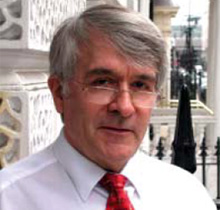Originally published in Issue 4 2005 icon

Dr Kenyon can also be reached directly, via www.doveclinic.com
Telephone: 020 7580 8886 or 01962 718 000
Q:
I recently stumbled across your website. Impressive! It’s so hard to find alternative treatments for cancer. I’m asking for help, Dr Kenyon, with this situation.My aunt is a nurse who resides in North Yorkshire. Her partner has had lymphosarcoma for a year and is not responding to the chemo, so he’s forced to accept something "alternative". He is 67 and has been told he is too old for stem cell treatment.
I have been looking into ozone therapy for him but cannot locate any clinics in the UK. It’s so hard to access one. His tumours are growing and, even though it’s not the last stage he needs help. If you can direct me to any clinics in the UK, preferably London, I will be extremely grateful. These need not be ozone therapy clinics; any that can set a protocol to treat his tumours will be worth trying.
A:
Your aunt’s partner has had lymphosarcoma for a year and you say it isn’t responding to chemotherapy. Chemotherapy is, in broad terms, only effective in about 4% of sarcomas, so in many ways it’s hardly worth using, because it also has a downside in that it depresses cell mediated immunity and is generally toxic.
Sarcomas, as a group of tumours, are tumours with a connective tissue and they are different in that fundamental respect to carcinomas, which are tumours of epithelial tissues.
Treatment approaches for sarcomas are largely surgical, but many sarcomas are inoperable by the time they are diagnosed.
The only significant results we’ve had are with a modified form of photodynamic therapy which allows deep penetration of the treatment. We have been successful in holding sarcomas in a stable state for, in some cases, up to a year. We haven’t cured any cases. We also use angiogenesis inhibitors, to stop new blood vessel formation of the tumour, and that, together with the PDT, has had some degree of result. I’m sorry I cannot be more positive, but that’s the reality.
You mention ozone therapy. We have a great deal of experience in ozone auto-haemotherapy. This is an "add on" treatment and is practically never given in its own right.
There is no clinical study evidence whatsoever that ozone kills any tumour cells, cancers or sarcomas. However, we often add ozone into our photodynamic therapy treatment, as this increases levels of oxygen in the body, and in photodynamic therapy we are trying to generate oxygen in a particular form which will kill tumour cells.
I hope this is helpful
Q:
My father has recently been diagnosed with prostate cancer (Stage three, I believe), for which his treatment will consist of hormone tablets, to prepare him for monthly hormone injections, and radiotherapy.He has been consuming 20 apricot kernels daily, and is concerned about whether he should stop them during his treatment. Can you please confirm whether it is safe for him to continue with the kernels throughout treatment, and how many he should be consuming daily?
A:
Your father can continue taking 20 apricot kernels a day throughout the treatment. He is safe to do this.
Twenty kernels is a reasonable dose. Some patients take many more but I think he should stick with this dose.
Q:
Do you have any information about chondrosarcoma of the rib cage? I have had surgery and five ribs removed.I did not have any follow-up treatment and now, almost two years on, another lump has started to grow on my collar bone.
I do not want to have surgery again.
A:
I am sorry to hear you have chondrosarcoma of the rib cage. The only known conventional treatment is surgery. Chemotherapy is not significantly effective and does have a significant downside.
Recurrence of chondrosarcoma following surgical resection is common. All we could offer would be photodynamic therapy using an agent which will penetrate into the bones.
If you would like further information on this, go to www.doveclinic.com and click on Next Generation PDT.
Unfortunately this is not claimed to be a cure, but hopefully could contain the disease.